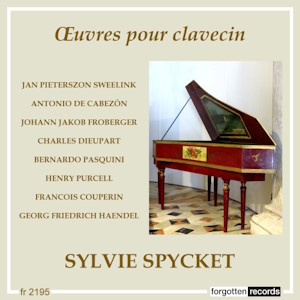
Sylvie Spycket (harpsichord)
rec. March 1960, Studio Vega, Paris
Forgotten Records FR2195 [50]
Sylvie Spycket (1919-1960) studied the organ with André Marchal, and harmony at the Paris Conservatory. In 1951 she won a first prize in harpsichord playing and then began a four-year study with Ruggero Gerlin in Sienna. In 1954 she founded Le Rondeau, an early music trio, and three years later her own Sylvie Spycket Instrumental Ensemble. She was actively engaged in research and performed numerous unpublished works with her groups as well as recording with Collegium Musicum de Paris, the Ensemble Instrumental Sinfonia and other leading French early music ensembles. I’m grateful to Forgotten Records’ one-paragraph biography for some of this information, as Spycket seems to be largely forgotten these days. Her grievous early death at the age of 40 and the extreme brevity of her professional career – no more than six years at the maximum – means that information is sadly lacking. There is a Diapason article online but it’s behind a paywall.
This LP was on BAM LD062, a label for which she made a number of recordings, specialising in German, French and Dutch harpsichord music of the seventeenth and eighteenth centuries. I don’t know with certainty what harpsichord she played but I’d stake my hat on a Pleyel. She makes a very robust sound and it’s securely in the Landowska tradition sonically and, indeed, interpretively. Parisian studios were dry, a favoured sound of French engineers and labels, so her sound is very present given the desire for clarity, and it emerges with richness of sound and with entertaining changes of registration. There is, though, grace to be heard in her Sweelinck as well as vitality. Her sonorous exploration of Antonio de Cabezón’s Diferencias sobre el Canto Llano del Caballero shows that she could cast her stylistic net wide. In the case of Froberger’s Suite in A minor – selected almost as if to showcase her feathery articulation – she proves an expressive exponent of the Sarabande where her sculpting of the bass sonorities is truly sepulchral.
She plays Dieupart’s Suite, a miscellaneous dance collection, with similar attention to detail and irradiated with moments of refinement, though cast in the larger context of a big-boned performance. Pasquini’s Six Airs are very brief charmers, character pieces none longer than a minute in length. She also plays Purcell’s Suite No.5 with a sense of robustness of a kind with her performances as a whole. Next to say, Robert Wooley’s much more recent performance, this can’t help but seem heavy and lacking in dance imperatives – but it represents a rather different aesthetic and a different time zone. Her use of the coupler, and of the lute – an upper 8’ lute? – gives the music a strikingly perky sonority. Her performance is shorn of repeats but full of personality. The same applies to the Couperin pieces, ingeniously played and evocative, as well as the final work, Handel’s Chaconne, HWV486, a truly sonorous and extrovert performance couched in – I need to use the word again – robust French style.
Spycket was a contemporary of George Malcolm. His own ‘revival’ harpsichord emulated Landowska’s, too, and he was as individualistic and quirky as Spycket – more so, in fact – as well as living very much longer. It’s in that context that she can perhaps best be seen, a transitional figure whose instrument and aesthetic is very different to the keyboard playing espoused by historically-informed performers of our own time and whose instrument hearkens back to pre-war days.
Her 1960 Studio Vega session has been finely transferred. Let’s hope there is more of her to come from this source.
Jonathan Woolf
| Availability |  |
Jan Pieterszoon Sweelinck (1562-1621)
Variations on ‘Mein junges Leben hat ein End’
Antonio de Cabezón (1510-1566)
Diferencias sobre el Canto Llano del Caballero (1578)
Johann Jakob Froberger (1616-1667)
Suite in A minor, FbWV610
Charles Dieupart (1676-1751)
Second Suite for Harpsichord in D minor
Bernardo Pasquini (1637-1710)
Six Airs in C minor
Henry Purcell (1659-1695)
Suite No.5 in C minor, Z.666
François Couperin (1668-1733)
Fourth Book of Harpsichord Pieces; 25th Order; E flat major and C minor
Georg Frideric Handel (1685-1759)
Chaconne in G minor with 21 variations, HWV486

















